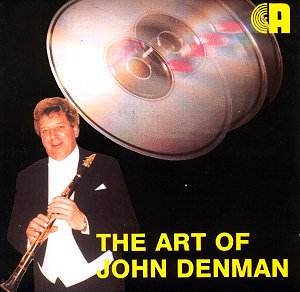John Denman (1933-2001) will be remembered with admiration
and affection by the many who saw or heard him. Training at the Royal
Military School of Music gave him an excellent grounding for a future
career as orchestral player and soloist – solo clarinettist in the Life
Guards, principal clarinettist of many London orchestras as well as
the Tucson Symphony after his emigration to America in 1976. He was
also a teacher of distinction, notably as Professor of Clarinet at Trinity
College. His many recordings gave an indication of his interests and
enthusiasms – that marvellous Lyrita Finzi Concerto, never so far transferred
to CD, his promotion of the British chamber tradition for the British
Music Label (Bax, Stanford, Ireland, York Bowen among others and all
standing with the best recordings made of them), not forgetting his
Mozart and Brahms with the Flesch Quartet, his Spohr and his jazz discs
with Buddy de Franco.
Here he plays a bravura collection of pieces, which
range widely and take in mild exotica, competition showpieces, baroque
transcriptions, virtuosic variations, operatic paraphrases and some
Kreislerian sweetmeats. It makes for a heady programme. He is partnered
by pianist Paula Fan, whom he married in 1982 and who proves herself
a most musical and alert accompanist and one who relishes the opportunities
for characterisation. The recital begins with Alfred Pratt’s Souvenir
d’Ispahan. Pratt was a conductor and repetiteur at Covent Garden
and the notes are spot-on to acknowledge some Fauré influence
because it opens, despite the exoticism of its title, not unlike his
Elégie. Denman’s middle register is prominent here in this luxuriant
but non-pictorial pseudo-oriental piece. Rabaud’s Solo de Concours
was a Paris Conservatoire competition piece and whilst it’s couched
in vernacular showpiece style it manages, as was the point, to examine
registral competence, scalar passages, tonguing and trills; especially
effective is the deliciously romanticised quasi-baroque slow middle
section. It’s hard not to be moved by the simplicity of the Denman arranged
Marcello; with his breath control and dynamic variance he shades this
with delicacy and charm. One clarinettist pays admirable tribute to
another in Louis Cahuzac’s Variations sur un Thème du Pays
d’Oc; delightfully sprung with an episode in the minor that
gives depth to the variations and adds consequent demands to the player.
Meister’s operatic paraphrase, the Erwinn Fantasy, was arranged
by another stellar clarinettist, Gustave Langenus, and is an operatic
paraphrase of leaping and diving animation – up and down the scale and
genuinely exciting.
Ronald Binge’s The Watermill – which may be
better known as the music for the British television series ‘The Secret
Garden’ – was originally written for oboe and strings. It’s true that
the clarinet and piano duo can’t quite replicate the plangency and wistfulness
of the original but it’s still a gorgeous tune. Crusell’s forceful and
clever variations receive a suitably engaged performance, one full of
vivacity and energetic virtuosity, fully worthy of Crusell’s frequently
exceptional demands. The two Kreisler pieces feature Denman in particularly
naughty mood; his rubati in Schön Rosmarin are certainly
daring, allowing elasticities of line to bend and inflect the music;
a violinist probably wouldn’t get away with it. And in Caprice Viennois
he indulges in some register changing (for dramatic purposes) as well
as lavishing affectionate phrasing on the evergreen. Denman and Fan
are as adept in the ballet warm-up piece The Fantasie-Ballet
of Mazellier as they are in the romantic glow of Bozza’s little Aria
or in the grandly imposing Lamento and subsequent sprightly Tarantelle
of Gabriel Grovlez, a Fauré student who was involved in the Monteverdi
revival in France.
Plenty of vivacious enthusiasm on display here; the
sound is excellent and the typos on the back of the jewel case aren’t
replicated in the booklet notes. No recording dates but an otherwise
charming and delightful disc.
Jonathan Woolf

